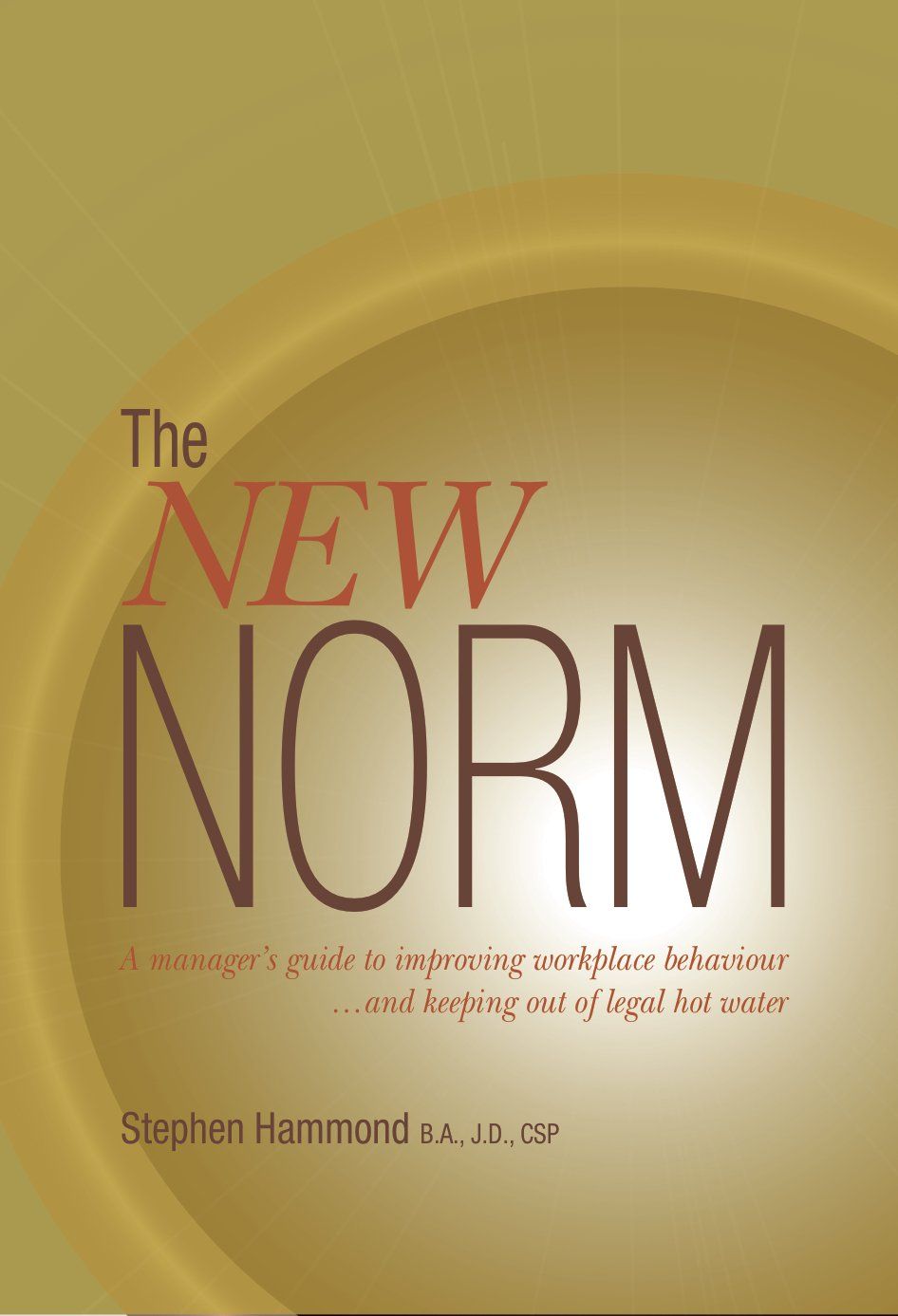Chapter Two
THE NEW NORM Realizes "consent" can be complex when power is involved
Dale Seip was a supervisor who went to a remote worksite with a newly hired female employee, Linda Dupuis. On their journey, they checked into a motel, at which point Dupuis discovered that her boss had booked one room with two beds.
There appeared to be some chemistry between them, and that night they started kissing, but when things started going further, she said “no.” They stopped, but later in the night he started caressing her and they ended up having sex several times by the time they reached the remote worksite.
Seip did not use any physical coercion and made no threat of adverse consequences regarding future employment. And except for that first protest, Dupuis didn’t resist their having sex, but she started getting upset with Seip and within weeks they discontinued their sexual relationship.
Seip was not only Dupuis’ summer supervisor with the Ministry of Forests, but he was also an adjunct professor at the University of British Columbia, where she would be taking her masters in forestry. After their initial sexual encounter, Seip publicly showed affection to Dupuis and there were signs that she did not like this, because she didn’t want other employees to know about their relationship.
After a few weeks, their working relationship became unpleasant and they no longer had sex. Before she started university in the fall, she changed her masters thesis so she would have limited contact with Seip. She also complained to UBC’s sexual harassment office and then to the B.C. Council of Human Rights.
Not every sexual encounter by employees qualifies as sexual harassment. After the Human Rights hearing took place, adjudicator Tom Patch noted, “Human rights legislation does not prohibit social or sexual contact between management and employees.”
Of course, the real issue comes down to consent and whether differences in rank between an employee and manager interferes with that consent. On this issue, the adjudicator said it was a difficult case because “I do not doubt that Seip thought that his sexual advances were welcome.”
Even though Seip thought Dupuis was consenting to have sex with him, he should have been more attentive due to his position of influence on her job and studies. Patch wrote, “Because of the imbalance of power that often exists between managers and their employees, managers must be very careful to ensure that they are not taking advantage of their position of authority to import sexual requirements into the job. In my view, the burden rests with the manager to be certain that any sexual conduct is welcomed by the employee and continues to be welcome.”
While a big mistake was Seip getting one motel room with two beds, the adjudicator noted there were times it might have seemed reasonable to have initiated sex with Dupuis (and also times it seemed unreasonable).
In the end, he wrote, “There was little evidence to suggest that she found his initial advances unwelcome – if anything, the weight of the evidence was in the other direction. However, when he persisted after she said ‘no,’ he crossed the boundary.
Dupuis may have welcomed or been ambivalent about Seip's initial sexual advances. That does not mean that any subsequent sexual conduct was acceptable. Dupuis drew a line at sexual intercourse. In my view, what followed that night and subsequently in the Queen Charlottes was sexual harassment.”
Perhaps if Mr. Seip had taken my Respectful Workplace online course, he would have learned about power and how it can be abused, whether that was his intention or not. He would have known that being sexual at work comes with consequences for the victim and himself.
This case, decided in 1993 and cited in many cases since, upset a lot of men. Up till then, most men thought that if you discerned there was consent, then it wouldn’t be considered sexual harassment, even though there might be later conversations about bad decisions.
There’s no indication Dale Seip was a bad person, but what we learned from this case is that we have to consider so much more than just our feelings when we feel there is “chemistry" with a colleague at work.
The OLD NORM
- goes with any feelings or instincts when initiating sex with a subordinate employee.
- hears “no” but understands with a bit of chemistry that can be changed into a “yes.”
- doesn’t understand how a position of authority over another employee has anything to do with anything when there are signals that someone’s interested.
- doesn’t give any thought to the fact that a subordinate employee might feel pressured to go along with certain advances.
The NEW NORM
- better understands that when there’s a power differential at work, people can’t take advantage of it, especially when it involves sex.
- hears “no” and understands it means “no.”
- even if there’s a feeling of “chemistry” with a subordinate employee, will give sober second thought before anything goes further.
- is willing to accept that consent is not a scientific word; there’s lots to consider.
Suggestions for the New Norm:
01
If you supervise, understand your “power” at work. Power isn’t just for people leading the “free world” or a major corporation. When employees are dealing with “power,” it’s usually just their immediate supervisor – the person who can decide if they keep their job or what opportunities they will get. Many people are not willing to challenge anyone with authority at work, so that means you can’t take advantage of it.
02
Keep your pants on when at work. Yes, people find their “true love” at work, but that’s got to be mutual. Even if it’s mutual, is a quick sexual encounter worth your career, or a very lengthy legal process? Control yourself and use some common sense, so you don’t jump into a sexual situation without considering the consequences.
03
Consent isn’t always clear. Because you have influence over an employee at work, while you’re thinking “love” or “lust,” the other person might be thinking “job” and “paying rent.” It’s difficult to imagine a person would go along with something as intimate as sex to keep a job, or to not upset the boss, but it can happen. Don’t put someone in a situation where they might feel they have to go along with anything they don’t want to.
This chapter gives you an understanding of what can go wrong, even when someone believes that with their workplace sexual relationship, consent has been given.
For more examples where people get into trouble due to power and hierarchy, regarding abuse in the workplace, consider reading
Chapter 8: The New Norm speaks up regardless of hierarchy.
Purchase a copy of The New Norm, or if you think all your supervisors and managers, could learn many valuable lessons about creating a respectful workplace, free of harassment, bullying and discrimination, you can get volume discounts.
What one reader has to say about Stephen’s book, The New Norm
“When I got up early this morning and headed for my computer here at home, I told myself, ‘Just skim read a few sections of Stephen’s book and get a note back to him.’ I couldn’t do that, Stephen. I read it all – every word. You have taken too long to write this book – Employees and Employers in Canada need to read this.
Stephen will capture your attention in highlighting up to date and interesting headlines which we all have an opportunity to learn from. If you believe you can simply skim read this book, think again! The mesmerizing case studies will leave you yearning to learn the conclusion as any great author should do for their readers. Sincere attention to the messages here can only result in best practices within Canadian workplaces.”
Melinda Heidsma
Executive Director, AiMHi, Prince George Association for Community Living

Respectful Workplace Online Training Course
If you, your employees or your managers want more information,
sign up for my new online training course:
The Respectful Workplace in Canada.
With 10 modules of useful, relevant and current information,
this course can help everyone at your workplace.
This may be the best online harassment training your people will get.
Stephen Hammond is a lawyer turned speaker and consultant in the field of harassment, sexual harassment, bullying, discrimination, diversity and inclusion at work.
The New Norm is Stephen’s third book.





